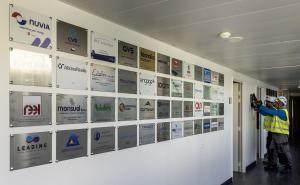Le mur de l'industrie honore les entreprises qui construisent ITER
Le tokamak ITER, avec ses millions de composants et ses spécifications techniques sans précédent, est la concrétisation physique de centaines d'avancées techniques dans de multiples disciplines. Si les physiciens des plasmas et les ingénieurs concepteurs d'ITER sont en grande partie responsables de ces spécifications, ce sont les entreprises sous contrat avec ITER Organization et les agences domestiques d'ITER qui sont à l'origine de ces avancées.
Pour rendre hommage à ces entreprises, ITER a créé un « mur de l'industrie », installé dans le couloir du 5e étage menant à la salle du Conseil ITER. Chaque plaque métallique gravée représente une des entreprises qui participent à la construction d'ITER.
L'agence domestique européenne Fusion for Energy, responsable d'environ 45 % des fournitures et du coût du programme ITER, et l'organisation ITER, responsable de l'assemblage et de la mise en service de la machine ainsi que d'un grand nombre de fournitures, ont été invitées à fournir des plaques représentant 50 entreprises fournisseurs. Les agences domestiques non européennes, représentant la Chine, l'Inde, le Japon, la Corée, la Russie et les États-Unis, ont été invitées à fournir 25 plaques d'entreprise chacune.
Les résultats sont impressionnants. Parcourir le corridor, c'est faire le tour du monde des noms d'entreprises, des composants techniques et des domaines d'expertise, mais c'est aussi faire le tour des langues, des cultures et et des pays participant à ITER sur trois continents. Certaines entreprises sont des leaders mondiaux de technologie connus dans toute l'industrie. D'autres sont obscures - pas connues du grand public peut-être, mais possèdent une expertise technique ou logistique unique qui répond à un besoin du programme ITER. En fait, le corridor de l'industrie est une veritable chaîne d'approvisionnement de la fusion.
Avec la hausse des investissements du secteur privé dans la fusion, cette contribution d'ITER - la création d'une chaîne d'approvisionnement pour la fusion - est de plus en plus considérée comme « une valeur certaine » pour de nombreuses autres initiatives dans le domaine de la fusion. Cette valeur est réciproque : maintenant qu'ITER a commencé à échanger avec les initiatives du secteur privé, les entreprises qui ont fourni la technologie à ITER peuvent trouver de nouveaux marchés où leur expertise sera recherchée. Ces possibilités seront l'un des thèmes principaux du ITER Business Forum qui sera organisé par l'Agence Iter France à Marseille au mois d'avril 2025.


